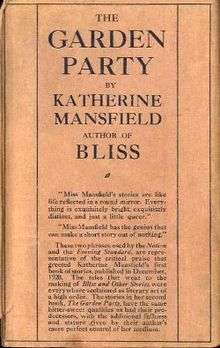The Garden Party (short story)
"The Garden Party is a 1922 short story by Katherine Mansfield. It was first published (as "The Garden-Party") in three parts in the Saturday Westminster Gazette on 4 and 11 February 1922, and the Weekly Westminster Gazette on 18 February 1922.[1] It later appeared in The Garden Party: and Other Stories.[2] Its luxurious setting is based on Mansfield's childhood home at Tinakori Road, Wellington.
Plot summary

The wealthy Sheridan family prepares to host a garden party. Laura is charged with instructing the workers on the placement of the marquee. Her haughty air quickly disintegrates into an intimidated admiration for the workingmen, with whom she feels a personal connection. Laura's mother, Mrs. Sheridan, has ordered masses of lillies, to both their delight. Laura's sister Jose tests the piano, and then sings a song in case she is asked to do so again later. After the furniture is rearranged, the Sheridans learn that their working-class neighbor Mr. Scott has died. While Laura believes the party should be called off, neither Jose nor their mother agrees. Laura eases her conscience by deciding to forget the matter until the party is over. When the evening comes, Mrs. Sheridan tells Laura to bring a basket full of leftovers to the Scotts' house to expose her to the world beyond their estate. Laura is led into the poor neighbors' house by Mrs. Scott's sister, sees the pitiable figure of the widow, and is led to the late husband's corpse. Here, Laura is intrigued by the sublimity of the corpse's face, and she finds death just beautiful as life. Having left the house, Laura meets her brother Laurie in an alleyway. She finds herself unable to explain life and death concisely, and Laurie understands that his sister has come to realize her own mortality.
Characters in "The Garden Party"
- Laura Sheridan, Mrs. Sheridan's daughter (and the story's protagonist)
- Mrs. Sheridan, Mr. Sheridan's wife and mother of Laura, Laurie, Meg, and, Jose. She is in charge of the household and relinquishes charge of the garden party to Laura.
- Laurie Sheridan, Laura's brother
- The workers, who put up a marquee in the garden
- Mr. Sheridan, Mrs. Sheridan's husband and father of Laura, Laurie, Meg, and, Jose. On the day of the party, he goes to work but joins the party later that evening.
- Meg Sheridan, a second daughter
- Jose Sheridan, a third daughter
- Kitty Maitland, a friend of Laura and a party guest
- Sadie, a female house servant
- Hans, a male house servant
- The florist, who delivers lilies ordered by Mrs. Sheridan
- Cook, a cook
- Godber's man, the delivery-man who brings in the cream puffs
- Mr. Scott, a lower-class neighbor who has just died
- Em Scott, the deceased's widow
- Em's sister
Major themes
Class consciousness. Laura feels a certain sense of kinship with the workers and again with the Scotts. An omniscient narrator also explains that, as children, Laura, Jose, Meg, and Laurie were not allowed to go near the poor neighbors' dwellings, which spoil their vista.
Illusion versus reality. Laura is stuck in a world of high-class housing, food, family, and garden parties. She then discovers her neighbour from a lower class has died and she clicks back to reality upon discovering death.
Sensitivity and insensitivity. The Sheridans hold their garden party, as planned, complete with a band playing music. Laura questions whether this is appropriate, given the death of their neighbor only a few hours earlier.
Death and life. The writer masterfully handles the theme of death and life in the short story. The realization of Laura that life is simply marvellous shows death of human beings in a positive light. Death and life co-exist and death seems to Laura merely a sound sleep far away from troubles in human life.
References to other works
- The names Meg, Jose, and Laurie may be related to Louisa May Alcott's 1868 novel Little Women.[3]
- The characters are also used in Mansfield's 1921 short story "Her First Ball".
- The events of the story can be interpreted as mirroring the Greek myth of Persephone.[4]
Literary significance
The text is written in the modernist mode, without a set structure, and with many shifts in the narrative.
See also
References
- ↑ Wilson, Janet; Reid, Susan; Kimber, Gerri (2011). Katherine Mansfield and Literary Modernism. London and New York: Continuum International Publishing Group. p. 52. ISBN 978-1-441-111302.
- ↑ Katherine Mansfield, Selected Stories, Oxford World's Classics, explanatory notes
- ↑ Katherine Mansfield, Selected Stories, Oxford World's Classics, explanatory notes
- ↑ Foster, Thomas C. (2003), How to Read Literature Like a Professor, New York: Harper-Collins Publishers Inc., ISBN 978-0-06-000942-7.
External links
- Full Text
-
 The Garden Party public domain audiobook at LibriVox
The Garden Party public domain audiobook at LibriVox - The Garden Party and Other Stories at the British Library